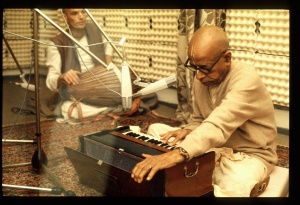CC Adi 14.6: Difference between revisions
m (1 revision(s)) |
No edit summary |
||
| Line 1: | Line 1: | ||
{{ | [[Category:Sri Caitanya-caritamrta - Adi-lila Chapter 14|C006]] | ||
<div style="float:left">'''[[Sri Caitanya-caritamrta|Śrī Caitanya-caritāmṛta]] - [[CC Adi|Ādi-līlā]] - [[CC Adi 14|Chapter 14: Lord Caitanya's Childhood Pastimes]]'''</div> | |||
<div style="float:right">[[File:Go-previous.png|link=CC Adi 14.5|Ādi-līlā 14.5]] '''[[CC Adi 14.5|Ādi-līlā 14.5]] - [[CC Adi 14.7|Ādi-līlā 14.7]]''' [[File:Go-next.png|link=CC Adi 14.7|Ādi-līlā 14.7]]</div> | |||
{{CompareVersions|CC|Adi 14.6|CC 1975|CC 1996}} | |||
{{RandomImage}} | |||
==== TEXT 6 ==== | ==== TEXT 6 ==== | ||
<div | <div class="verse"> | ||
bālya-līlāya āge prabhura uttāna śayana | :bālya-līlāya āge prabhura uttāna śayana | ||
pitā-mātāya dekhāila cihna caraṇa | :pitā-mātāya dekhāila cihna caraṇa | ||
</div> | </div> | ||
| Line 12: | Line 16: | ||
==== SYNONYMS ==== | ==== SYNONYMS ==== | ||
<div | <div class="synonyms"> | ||
bālya- | ''bālya-līlāya''—in His pastimes as a child; ''āge''—first of all; ''prabhura''—of the Lord; ''uttāna''—turning the body; ''śayana''—lying down; ''pitā-mātāya''—unto the parents; ''dekhāila''—showed; ''cihna''—marks; ''caraṇa''—of the lotus feet. | ||
</div> | </div> | ||
| Line 19: | Line 23: | ||
==== TRANSLATION ==== | ==== TRANSLATION ==== | ||
<div | <div class="translation"> | ||
In His first childhood pastimes the Lord turned upside down while lying on His bed, and thus He showed His parents the marks of His lotus feet. | In His first childhood pastimes the Lord turned upside down while lying on His bed, and thus He showed His parents the marks of His lotus feet. | ||
</div> | </div> | ||
| Line 26: | Line 30: | ||
==== PURPORT ==== | ==== PURPORT ==== | ||
<div | <div class="purport"> | ||
The word uttāna is also used to mean “lying down on the bed face upwards” or “lying down flat on the bed.” In some readings the word is utthāna, which means “standing up.” In His childhood pastimes the Lord tried to catch the wall and stand up, but as an ordinary child falls down, so the Lord also fell down and again took to lying on His bed. | The word ''uttāna'' is also used to mean “lying down on the bed face upwards” or “lying down flat on the bed.” In some readings the word is ''utthāna,'' which means “standing up.” In His childhood pastimes the Lord tried to catch the wall and stand up, but as an ordinary child falls down, so the Lord also fell down and again took to lying on His bed. | ||
</div> | </div> | ||
__NOTOC__ | |||
<div style="float:right; clear:both;">[[File:Go-previous.png|link=CC Adi 14.5|Ādi-līlā 14.5]] '''[[CC Adi 14.5|Ādi-līlā 14.5]] - [[CC Adi 14.7|Ādi-līlā 14.7]]''' [[File:Go-next.png|link=CC Adi 14.7|Ādi-līlā 14.7]]</div> | |||
__NOTOC__ | |||
__NOEDITSECTION__ | |||
Revision as of 16:06, 15 July 2021

A.C. Bhaktivedanta Swami Prabhupada
TEXT 6
- bālya-līlāya āge prabhura uttāna śayana
- pitā-mātāya dekhāila cihna caraṇa
SYNONYMS
bālya-līlāya—in His pastimes as a child; āge—first of all; prabhura—of the Lord; uttāna—turning the body; śayana—lying down; pitā-mātāya—unto the parents; dekhāila—showed; cihna—marks; caraṇa—of the lotus feet.
TRANSLATION
In His first childhood pastimes the Lord turned upside down while lying on His bed, and thus He showed His parents the marks of His lotus feet.
PURPORT
The word uttāna is also used to mean “lying down on the bed face upwards” or “lying down flat on the bed.” In some readings the word is utthāna, which means “standing up.” In His childhood pastimes the Lord tried to catch the wall and stand up, but as an ordinary child falls down, so the Lord also fell down and again took to lying on His bed.